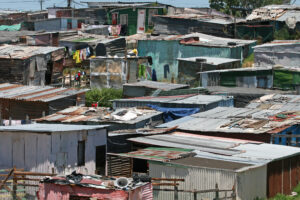Tenderpreneurs are still justified in using the past to access lucrative contracts while the majority still have limited access to the economy.

When you go through a period with a defined term and there’s a lot of evil in and around it, the association with the term itself tends to become evil. It’s no wonder people don’t want to be associated with apartheid, nor should they. It sucked on so many levels. Equally, things like racism, nepotism and inequality have come to be sucky adjectives in our lexicon.
The association with those terms has become so automatically abhorrent that there’s seemingly no need to question anything around it. Just call something by the name and people will automatically despise it.
It may be difficult to fathom by today’s standards how anything attached to those terms can be justified and it’s likely that they can’t. We just need to keep tabs on what they mean and how we use them.
Even the late great anti-racism thinker, Eusebius McKaiser had a brilliant reflection in his first book about how it could be okay to have romantic attractions impacted by race and it not be racism. If the only person who can fix Eskom happens to be related to some minister, who cares about the relationship as long as we end load shedding? When two people start out with R50 000 but one turns to drugs and the other invests it, is that really inequality down the line?
These are basic scenarios, which in reality will obviously come with more complexities, of course. It just illustrates that there can be instances where things we tend to automatically write off as evil might not necessarily be evil.
ALSO READ: ANC government selling our country – bit by bit
Yes, Prince Ginger’s nazi gaff was racist and stupid, as was Justin Trudeau’s blackface. Blackface itself is considered a bad thing but then what of using it in the genius critical manner as was done in the film Tropic Thunder? If anything, that pointed real artistic criticism at some real racist issues.
It’s become far too easy to see something, not think about it and then assign an adjective to it to make people think it’s evil… even when it’s not. And even when it is evil, just calling it something we’ve assigned as bad causes less thought around it which, in turn, perverts how we resolve it.
It’s why it’s so annoying that the world is tacking on the term “apartheid” in the Middle East conflict. There are many similarities but there are also significant differences; you’re talking about separate states. There are differences in ideas of sovereignty to apartheid South Africa and the contextual history with associated violence and inclusion of international role-players creates vastly different issues to those dealt with in apartheid South Africa.
So, one could call Israel an apartheid state but calling it so doesn’t change those differences. If anything, it’s using our historical suffering to lazily score a political argument without engaging those differences, regardless of the UN definition.
Closer to home, we see a bunch of policy and conversation trying to deal with our past. It’s a difficult past to deal with and comes with generations of issues. Make no mistake, we have a surplus of racism but is crying racism the solution to those issues?
When a person accused of murder makes a primary defence that they are being targeted because of race, should there not be an obligation to show something for it? The prosecution will have to make their case beyond reasonable doubt in any event. Playing the race card as a defence should surely not be as easy as just stating it. Though it seems that it may be, at least in the eyes of the defence.
The tenderpreneurs living in the top 1% are still justified in using the past to access lucrative contracts while the majority still have limited access to the economy and no amount of redress seems to filter down to them. Should those tenderpreneurs still be able to milk the teat of redress at the expense of those still below the poverty line due to our history?
It makes little sense to run a country on narrative alone, yet it seems we could head that way because we’ve identified bad things but made it easy to ascribe them to situations without having to deal with them.
Pit toilets, dirty water, lack of electricity, poor education and lack of services; these still exist yet we’ve spent some 30 years trying to fix them and they seem to get worse. We’ve diverted a lot of resources to trying to uplift the poor because of the atrocities of our past and yet it’s not looking good.
Those resources sure have helped a couple of people and continue to help them even if they don’t need the help any longer.
It scares me because it as much as we’d like to redress the issues of our past, we seem to be creating a new brand of apartheid beneficiaries and the ones who still need the redress, don’t seem to be getting it.
ALSO READ: After all the SOEs, SA needs a recovery plan for its taxpayers
Support Local Journalism
Add The Citizen as a Preferred Source on Google and follow us on Google News to see more of our trusted reporting in Google News and Top Stories.






